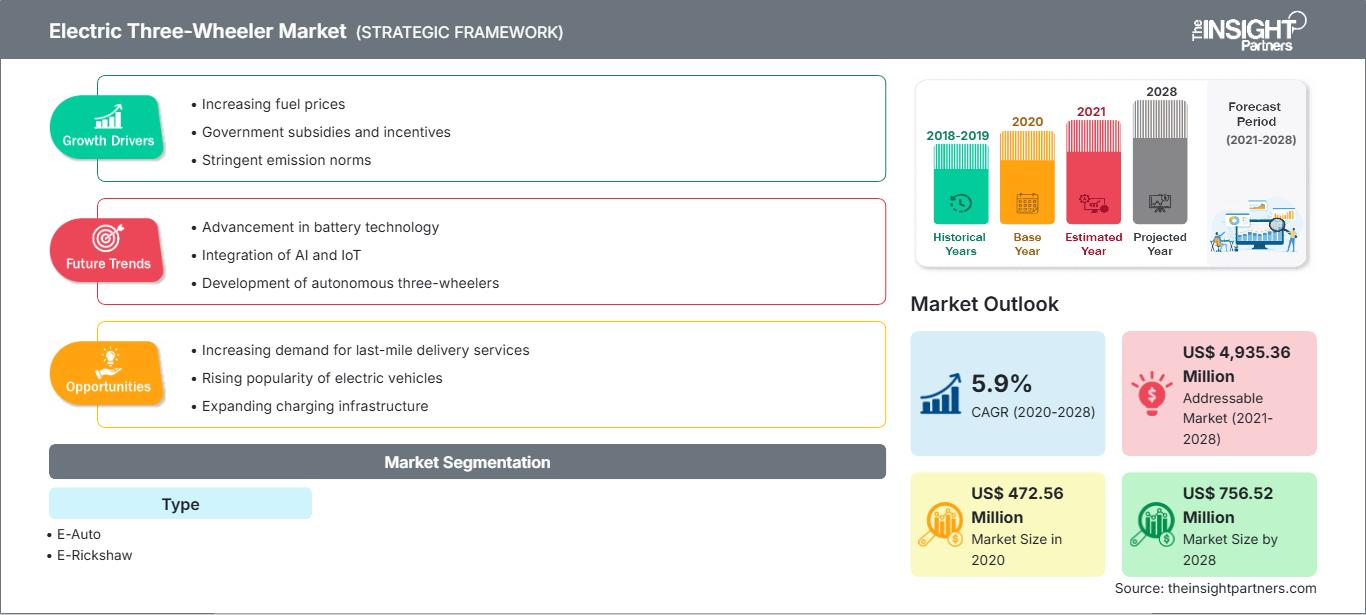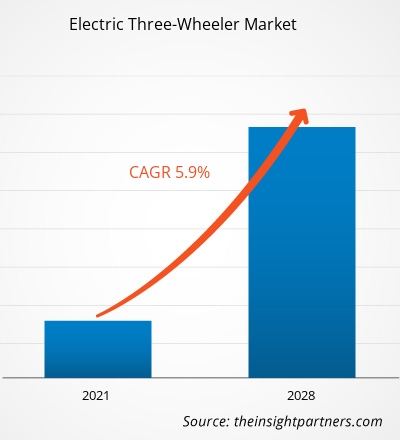The electric three-wheeler market was valued at US$ 472.56 million in 2020 and is projected to reach US$ 756.52 million by 2028; it is expected to grow at a CAGR of 5.9% from 2021 to 2028.
Electric three-wheelers are widely used for carrying passengers to their desired destination as well as for the transportation of goods. These three-wheelers run on electric motors powered by rechargeable batteries. The batteries can be recharged at an electric charging station or any other respective charging point. Many low as well as middle income countries across the world have a higher usage rate of three-wheelers, which were initially powered by Internal combustion (IC) engines. But most of these internal combustion engine three-wheelers have become inefficient and old. This has led the manufacturers to increase their expenditure on research and development of electric three-wheelers. Moreover, electric three-wheelers are much popular in urban and suburban areas specially to transport a small number of passengers and compact goods in short span of time. A few of the key factors driving the electric three-wheeler market growth are strict government norms and regulations regarding pollution control, rising awareness about harmful effects of emissions from diesel vehicles and gasoline, and growing acceptance for electric vehicles. Since petrol and diesel are exhaustible resources, people have already started thinking about other possible alternatives. Electric three-wheeler vehicles have started replacing petrol and diesel three-wheeler vehicles. Average cost of maintenance and operation of electric three-wheelers is substantially lower than conventional three-wheelers. However, heavy battery pack and low range of distance covered are some of the areas of concern faced by the manufacturers of electric-three-wheeler vehicles. Electric three-wheelers cover ~125–130 kms with its battery fully charged, while conventional vehicles cover ~200–220 Kms with full fuel tank.
APAC dominated the electric Three-Wheeler market in 2020. India is one of the largest shareholders in the electric three-wheelers market in the region. The low-emission vehicle industry in the country is growing rapidly on the back of favorable initiatives by governments as well as robust presence of manufacturers such as Mahindra & Mahindra, Atul Auto, Piaggio, and Lohia Auto. The Faster Adoption and Manufacturing of Hybrid and Electric Vehicles II (FAME II) Scheme, with a budget of USD 1.4 billion, would be spending USD 1.19 billion on enabling upfront discounts on EV purchases and USD 1.9 million on promoting the implementation of charging infrastructure. To meet demand, these measures will benefit 0.5 million electric three-wheelers.
Customize This Report To Suit Your Requirement
You will get customization on any report - free of charge - including parts of this report, or country-level analysis, Excel Data pack, as well as avail great offers and discounts for start-ups & universities
Electric Three-Wheeler Market: Strategic Insights

-
Get Top Key Market Trends of this report.This FREE sample will include data analysis, ranging from market trends to estimates and forecasts.
Impact of COVID-19 Pandemic on Electric Three-Wheeler Market
The COVID-19 outbreak has severely disrupted the supply chain and manufacturing of electronics equipment, including the hardware components of electric three-wheelers. On the basis of the emergence of COVID-19 virus across the world, followed by lockdown scenarios, the automotive industry experts have predicted that the industry would face at least a quarter of lag in electronics equipment supply chain. The electronics equipment and automotive industry is likely to pick up pace soon after the governments lift the various containment measures, which would help revive the economies. The production of the electronics equipment and automotive products is anticipated to gain pace from 2021, which is further foreseen to positively influence the electronics equipment and automotive manufacturing, including hardware components of electric three-wheelers.
Market Insights
Increasing Level of Harmful Gases, Managing Cost, and Acceptance of Cleaner Technologies
Rising level of harmful gases, managing cost, and acceptance of cleaner technologies are among the major factors contributing toward the growth of electric three-wheeler market. The adoption of electric vehicles can drastically reduce the emission of pollutants in the environment, thereby improving the air quality. To minimize the emission of greenhouse gases via combustion of vehicular fuel, regulatory bodies across the world are offering tax benefits and incentives to increase the adoption of environment-friendly vehicles. Almost all the leading countries have announced subsidies and financial incentives to attract manufacturers to produce more electric vehicles locally. Also, tax credits and rebates are attracting many local users to purchase EVs and are likely to bring out at least about 60% green vehicles on the road by 2020, thereby reducing fuel emissions and lowering the reliance on petroleum products. The regulatory bodies of China, India, South Korea, Indonesia, and Bangladesh have been implementing various programs to enhance the sales of electric three-wheelers. For example, in March 2018, India's Ministry of Heavy Industries and Public Enterprises launched Phase-II of the FAME India Scheme, which received a total budgetary support of US$ 1.39 billion. This phase aims to support 500,000 electric three-wheelers; 55,000 electric four-wheeler passenger cars; 7,000 e-Buses; and 100,000 electric two wheelers through subsidies. This phase of the FAME Scheme aims to establish adequate public charging infrastructure to boost the EV adoption among the masses. With this, the Ministry of Heavy Industries and Public Enterprises anticipates the involvement and active participation of a wide range of stakeholders, including Public Sector Enterprises (PSEs) and government agencies.
Type-Based Market Insights
The electric three-wheeler market, by type, is segmented into e-auto (high speed) and e-rickshaw (low speed). The e-rickshaw segment led the market in 2020. E-rickshaws are under-powered electric three-wheeler vehicles, and they have lower battery capacities compared to e-auto.
Product developments and market initiatives are the commonly adopted strategies by companies to expand their product portfolio. Piaggio & C. SpA, Terra Motors Corporation, Kinetic Green Energy & Power Solutions Ltd., LOHIA AUTO INDUSTRIES, and Mahindra Electric Mobility Limited are among the key players implementing strategies to enlarge the customer base and gain significant share in the global electric three-wheeler market, which, in turn, permits them to maintain their brand name. A few of the recent key developments are mentioned below:
- In October 2020, Mahindra Electric Mobility Ltd announced the launch of its new electric 3-wheeler cargo model—Treo Zor—in India. Based on the proven Treo platform, the cargo would be provided in 3 variants—Pickup, Delivery Van, and Flat Bed.
- In February 2018, Mahindra & Mahindra Ltd and LG Chem announced a collaboration in the field of advanced Li-ion battery technology.
The regional trends and factors influencing the Electric Three-Wheeler Market throughout the forecast period have been thoroughly explained by the analysts at The Insight Partners. This section also discusses Electric Three-Wheeler Market segments and geography across North America, Europe, Asia Pacific, Middle East and Africa, and South and Central America.
Electric Three-Wheeler Market Report Scope
| Report Attribute | Details |
|---|---|
| Market size in 2020 | US$ 472.56 Million |
| Market Size by 2028 | US$ 756.52 Million |
| Global CAGR (2020 - 2028) | 5.9% |
| Historical Data | 2018-2019 |
| Forecast period | 2021-2028 |
| Segments Covered |
By Type
|
| Regions and Countries Covered |
North America
|
| Market leaders and key company profiles |
|
Electric Three-Wheeler Market Players Density: Understanding Its Impact on Business Dynamics
The Electric Three-Wheeler Market is growing rapidly, driven by increasing end-user demand due to factors such as evolving consumer preferences, technological advancements, and greater awareness of the product's benefits. As demand rises, businesses are expanding their offerings, innovating to meet consumer needs, and capitalizing on emerging trends, which further fuels market growth.

- Get the Electric Three-Wheeler Market top key players overview
Electric Three-Wheeler Market Segmentation:
By Type
- E-Auto (High Speed)
- E-Rickshaw (Low Speed
Company Profiles
- Goenka Electric Motor Vehicles Private Limited
- Piaggio & C. SpA
- Terra Motors Corporation
- Kinetic Green Energy & Power Solutions Ltd.
- LOHIA AUTO INDUSTRIES
- Bodo Vehicle Group Co. Ltd.
- Nobe Cars
- Mahindra Electric Mobility Limited
- E-Tuk Factory BV
- JIANGSU KINGBON VEHICLE CO., LTD
Frequently Asked Questions
Which type is expected to dominate the market in the forecast period?
What are reasons behind electric three-wheeler market growth?
What are market opportunities for electric three-wheeler?
- Historical Analysis (2 Years), Base Year, Forecast (7 Years) with CAGR
- PEST and SWOT Analysis
- Market Size Value / Volume - Global, Regional, Country
- Industry and Competitive Landscape
- Excel Dataset
Recent Reports
Related Reports
Testimonials
Reason to Buy
- Informed Decision-Making
- Understanding Market Dynamics
- Competitive Analysis
- Identifying Emerging Markets
- Customer Insights
- Market Forecasts
- Risk Mitigation
- Boosting Operational Efficiency
- Strategic Planning
- Investment Justification
- Tracking Industry Innovations
- Aligning with Regulatory Trends





















 Get Free Sample For
Get Free Sample For